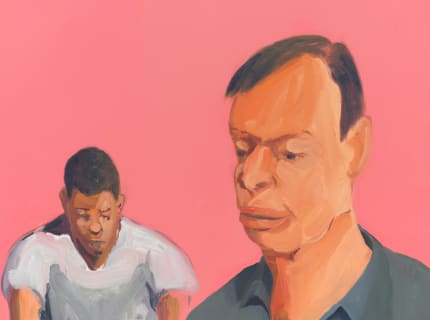Between Us
Alexander Gray Associates, Germantown presents Between Us, an exhibition gathering works by an intergenerational group of queer artists advancing the practice of portraiture. Confronting the cyclical progress and backlash of the last forty years, these artists bear witness to civil rights and gay liberation movements, the AIDS crisis, the rise of online communities, and the recurring culture wars around LGBTQIA+ rights that have come to a head in recent years. The works on view are charged with an emotional resonance—infused with curiosity and risk, exuberance and desire, grief, and impermanence—testifying to the evolving realities of queer life.
Throughout the exhibition, popular culture is deconstructed and recontextualized as artists intervene in discursive narratives around gender and sexuality. G.B. Jones and Paul P. have a longstanding, collaborative friendship—Jones being known for her queercore music and drawing practice and Paul P. for his ethereal paintings of young men whose likenesses, culled from 1970s pornography, are rendered with a soft, lyric romanticism. Likewise, Joey Terrill’s adaptation of popular modes of figuration and appropriation of mass media imagery satirizes the commodification of queer and Chicanx identities.
Other participating artists turn their gaze upon themselves and those closest to them, creating works that delineate the politics of human relationships, archiving individuality as testament against historical erasure. Lyle Ashton Harris is known for his exploration of photographic space as a fusion of performance and authentic self-presentation. Harris debuts a triptych of an Ashanti bodybuilder photographed in Accra, Ghana, where the artist lived from 2005–2012. Harris’s sensitivity to his subject—whose bearing is simultaneously naturalistic and performative—is also evident in Alannah Farrell’s compositions. Farrell, who is trans-identifying, draws from life, portraying themself, friends, lovers, and others in intimate states of self-assured repose that destabilize cisgendered notions of the gaze.
Queerness is taken up as a political position through which one’s identity is made indeterminate, exteriorized, and consciously enacted. Cabaret performer and activist Justin Vivian Bond’s graceful self-portraits address identity formation as relying upon a “subjective association with an external image.” Hugh Steers’s poignant scenes of male figures, including an apparent self-portrait, are suffused with erotic and introspective tension—a tenet of the artist’s depictions of everyday life under the specter of the AIDS epidemic in the late 1980s and early 1990s.
The indexical capacity of portraiture offers a framework for processing collective trauma. Kang Seung Lee reconstitutes underrepresented histories of queer expression, revisiting art historical precedents and relying upon archival research to memorialize artistic forerunners whose lives were cut short by AIDS. Steve Locke’s paintings focus on the vulnerability of male desire, reflecting his experience as a Black gay man navigating a prejudiced society. His portraits question how meaning is made and ascribed by looking. They often feature Locke’s perennial motif of a man with his tongue out—a polysemic expression that is at once comedic, disturbing, and suggestive.
Between Us takes an expansive view of portraiture, complicating notions of representation and visibility. The acts of seeing and being seen are deployed as creative vehicles through which to reflect on representation, intimacies shared with friends, lovers, and strangers, and as a mutable mirror by which artists recognize others and, in turn, realize and reinvent themselves.




